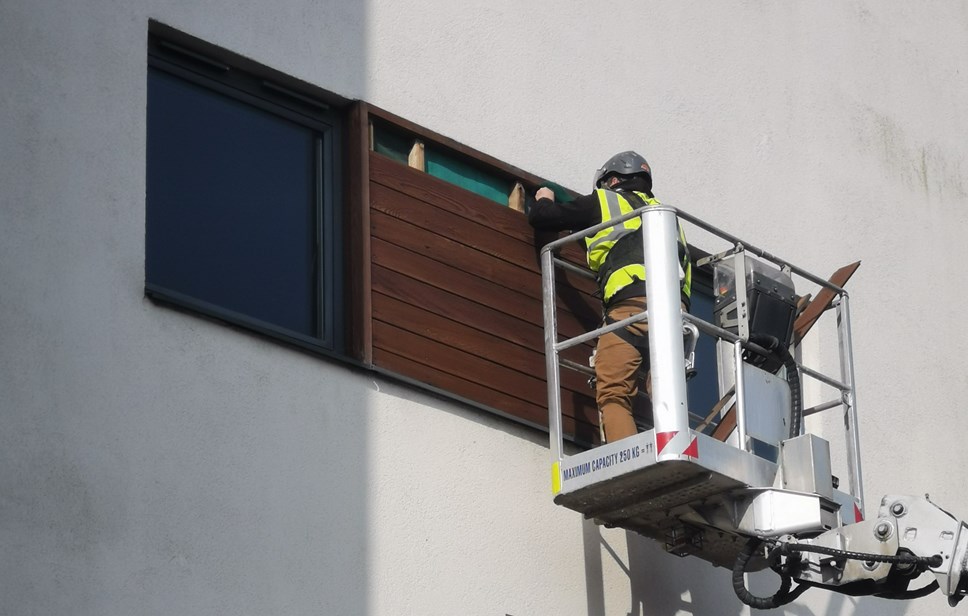
Calls for a UK-wide approach to building safety
Galw am ddull gweithredu ledled y DU o ran diogelwch adeiladau
Climate Change Minister Julie James has made fresh calls for a UK-wide approach to building safety as she set out the progress Wales has made on repairing building defects in Wales.
She today called on the UK Government to extend its England-only developer pledge, which commits developers to repairing buildings they were involved in developing, to the rest of the UK.
The Minister warned the current “unilateral approach” to building safety makes it harder to ensure developers take their responsibilities to contribute towards the costs of fixing building safety issues in Wales seriously.
The Welsh Government has earmarked £375m towards repairing identified building safety issues.
Wales is taking a “whole-building approach” to building safety and is committed to repairing wider fire safety issues – not just cladding problems.
In a statement to Members of the Senedd today, Julie James said: “We continue to do everything in our power to repair building safety defects – without these costs falling on leaseholders – and to reform building safety law. But there are many things our governments can do to improve building safety on a UK basis.
“I was therefore deeply disappointed when the Secretary of State for Housing, Levelling Up and Communities Michael Gove announced an England-only developer pledge last month.
“The Scottish Government Cabinet Secretary for Social Justice, Local Government and Housing, Shona Robison and I have repeatedly called on the UK Government to adopt a UK-wide approach to the pledge.
“The UK Government’s unilateral approach to building safety issues makes it harder to ensure all developers take their responsibilities to contribute towards the costs of fixing building safety problems in Wales seriously.
“It inhibits our ability to hold developers and manufacturers to account for fixing their mistakes and it runs counter to the recent Review of Intergovernmental Relations.
“It also creates more confusion for residents at a time when they need consistency and clarity.”
The Welsh Government has had ongoing meetings with the UK Government about building safety and is continuing to continuing to press for:
- A change in the pledge letters with developers and in the detailed legal agreements to secure a matching and proportionate commitment to self-remediate across the UK.
- For the UK Government to redouble its efforts to introduce a credible, affordable and UK-wide public indemnity insurance scheme this year and to commission work to support the creation of a companion insurance scheme for certification of remedial works, which includes relevant aspects of fire safety.
- The Building Safety Levy to be extended across the UK.
- Support from Secretary of State Gove in seeking additional capital and resource funding from HM Treasury for building safety.
The Minister is also writing to stakeholders to update them about the progress of the repair work underway across Wales.
“Our repair programme goes beyond just replacing external cladding. It includes compartmentation, fire alert and evacuation and suppression systems,” she said.
“This whole-building approach puts people’s safety first but is more complex than one which only deals with cladding. It is also more expensive.
“We have earmarked £375m over the next three years to invest in repair work – this is double the population share of what the UK Government has said it plans to spend in equivalent areas in England in this period.
“At the heart of our approach is the fundamental belief that developers should contribute towards the costs of fixing these problems. Leaseholders and residents should not have to foot the bill.”
Notes to editors
Wales’ repair programme is underway now. There are three main schemes involved:
- Repair of non-compliant cladding in high-rise buildings
- The Welsh Building Safety Fund
- The Leaseholder Support Scheme
In the aftermath of the Grenfell fire, 12 private and three social sector high-rise (18m) residential buildings were found to have non-compliant ACM cladding in Wales.
Work to remove and replace non-compliant ACM cladding has been successfully completed on the three social sector high-rise residential buildings.
Work has either started, or action plans are in place to progress work, on the 12 buildings in the private sector. This work is being funded by buildings’ owners and developers.
In September 2021 we opened up the Welsh Building Safety Fund for residential buildings 11m or higher. It is designed to scope out any necessary work and help to prioritise buildings for repair work.
The Welsh Government received 248 expressions of interest and have now completed digital surveys on those buildings to determine whether more intrusive surveys are needed. More than 100 buildings have been identified for these further intrusive surveys. We expect this survey work to be completed by the end of the summer.
These surveys are the entry point for buildings seeking support for repair and remediation works.
The Welsh Government has earmarked £375m over the next three years to invest in building safety work and we believe that leaseholders should not have to pay towards these repairs.
The Welsh Government is also finalising plans for a Leaseholder Support Scheme. This would be a fund for leaseholders who are facing severe financial hardship as a result of costs relating to building defects.
The fund is being designed to help those people who are struggling financially and unable to sell their properties because of escalating costs associated with fire safety issues. It will give eligible leaseholders access to the right support to meet their individual circumstances, including an option to sell their property and, where appropriate, to either move on or rent the property back.
More details of the scheme will be announced in June.
